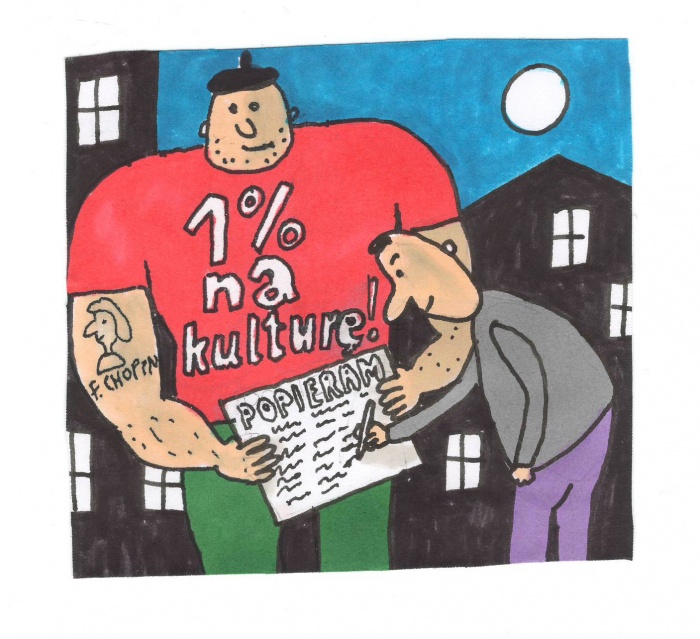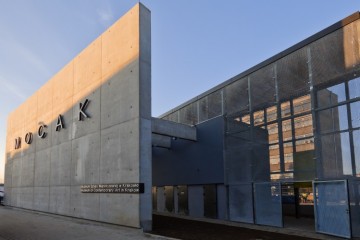Stale Dichotomy
“A nation that does not want ‘greatness’, is finished,” Cardinal Stefan Wyszyński – played by Olgierd Łukaszewicz – says in the stage play Polacy (Poles) directed by Gabriel Gietzky at Teatr Polski (Polish Theatre) in Warsaw earlier this year. Witold Gombrowicz, played by Radosław Krzyżowski, meanwhile, talks of the ordinary, the commonplace. “Our greatest holiness is contained in our most ordinary commonplace existence,” he says in the play. “I always wanted it to be that Poles could proudly say: ‘I am a slave nation.’ Not that I have been fooled, but that I am able to judge my place in the world, to realise my situation ... and therefore that I am a fully-fledged man.”
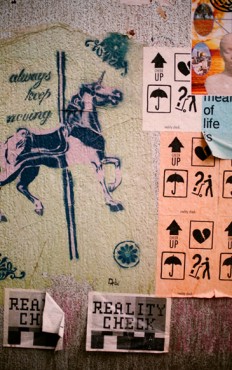 Like many matters human, things
Like many matters human, things
evolve because humans make them
evolve.
Biweekly#12 cover, photo A. SłodownikIt is often – perhaps too often - said that there are two Polands fighting for the country’s soul, and also for its pocket. Polska A versus Polska B, Wyszyński versus Gombrowicz, Tusk versus Kaczyński and so on. Neither “side” is ever very far from the surface, whether it be in political life, daily conversation or at times even within the same individual. The conflicts, the contradictions and the confusions seem to be embedded in the country’s personality: liberal, critical, secular versus conservative, patriotic, catholic. This is a common enough representation of Poland (and one or two other countries one can mention) and one that despite 20 years of democracy and sovereignty is still at the forefront of many minds. But this notion itself is becoming a bit stale, perhaps, and with so many overlapping – overt and covert – cleavages and the obvious unevenness of Poland’s post-communist development, the message is never that clear. It is also, like all things human, ever evolving. But, like many matters human, things evolve because humans make them evolve.
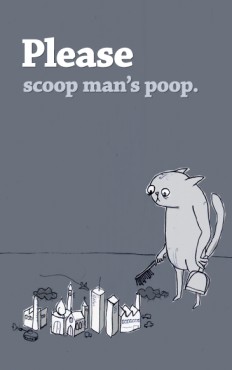 People can eat what they like, consume
People can eat what they like, consume
what they choose, even it is not very
good for them.
Biweekly#14 cover by enenekThe “end of ideology” and “end of history” discourses of the 1990s left us with a void, in some important ways a sense of helplessness. Nothing could be changed, the state was irrelevant, an impediment even. This would be a culture filled by fast cars, high rise offices and a sense that nothing could be done to halt social degeneration, or resist social division. Culture would become increasingly commodified, little or no thought for how it is made, for the production process. People can eat what they like, consume what they choose, even it is not very good for them. The old elitism of “we know best” probably had to loosen its grip and did, largely. The Academy, the Institute, the Cultural Elite withdrew its forces. But the collapse of the state’s role as benefactor of the arts, of culture more widely, seen across most art forms in Poland (and the region) left a deep scar and one that is only slowly healing. People from the world of film, to posters, to dance, theatre and classical music have all spoken of the bewilderment they faced after 1989 when the state started rolling back its funding. Commercial films in Poland appear to have been the most egregious example of an art form that had very strong and very idiosyncratic Polish roots that was lost somewhere in the rush to become “normal”, to become “Western”. Films tended in the 1990s to follow the lowest common denominator, filling seats in multiplexes more important than asking hard questions, ones that early generations may not have wanted to face, but had had to and usually did.
Citizens of Culture
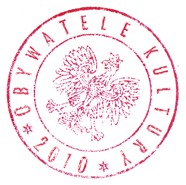 Citizens of Culture logoIt is more of a hunch than based on any real empirical investigation, but things seem to be changing. Some kind of healing process seems to be emerging, a nascent attempt perhaps to reconstruct a collective sense of purpose, in the cultural sphere at least. This is manifest in the Citizens of Culture (Obywatele Kultury) social movement, which brings together a broad spectrum of groups, across classes, across the political divide and across the arts. It is a look back at more traditional, more Polish, ways of doing things. Poland has a very collaborative and creative culture, seen in the workplace at many levels, in the family, among friends and this is certainly a dominant theme when talking with people involved in the movement.
Citizens of Culture logoIt is more of a hunch than based on any real empirical investigation, but things seem to be changing. Some kind of healing process seems to be emerging, a nascent attempt perhaps to reconstruct a collective sense of purpose, in the cultural sphere at least. This is manifest in the Citizens of Culture (Obywatele Kultury) social movement, which brings together a broad spectrum of groups, across classes, across the political divide and across the arts. It is a look back at more traditional, more Polish, ways of doing things. Poland has a very collaborative and creative culture, seen in the workplace at many levels, in the family, among friends and this is certainly a dominant theme when talking with people involved in the movement.
The search for explanations, the need simply to stop, look around, to explore, for a collective conversation, for ideas and frameworks within which thoughts, problems, and solutions can be aired is palpable. As is the sense of frustration that it has taken so long for Poland, for Poles, to refind the confidence to express their collective creative voice in a coherent way and have the conviction to demand it be heard – and also funded, of course!
“We need new libraries, not new churches,” says Beata Chmiel, a figurehead for Poland’s phenomenally fast growing social movement that is Citizens of Culture – one of the engines of this shift forward by looking backwards. From behind her imposing desk at the National Museum in Warsaw, where she also occupies the position of deputy museum director, Chmiel says the process is about dealing with resolving wider issues of social exclusion, about giving people the instruments to function as citizens. “We need safe and secure, inviting places for kids, for families. The library, not the church, is the most socially respected institution in Poland.” This is nothing if not a political statement in a country as devout as Poland.
“This social movement [Citizens of Culture] was borne of frustration. There has been no investment in culture and no real change in the culture of public cultural institutions in Poland, so this is a movement of ‘many minds and many hands,’ which is at least getting people to start talking about culture, about culture’s role in society, about what we want. It is about changing the conversation,” Chmiel says.
The initial impulse behind the movement was a conference organised by the Ministry of Culture in 2009, Chmiel says. “There was a lot of public money for PR, but no space for real debate. Slowly a lot of different areas of the arts started to talk, internally and between each other. But after a big event in Kraków in 2009 where a lot of nice and grand words were spoken we realised that nothing was actually happening. So, we decided to create the forum and a petition that would demand that 1% (about PLN 800million or EUR 200 million a year) of the state budget be allocated to culture, up from the current 0.5% and 0.37% if EU moneys are excluded.”
Chmiel says the notion of solidarity was – is – essential in the Polish context. “This is not a lobby, this is a mass movement, our petition was signed by people from all over Poland, all classes, all political persuasions. We started to become a real political force. All the presidential candidates in the 2010 election campaign signed the petition – Komorowski, Kaczyński, Napieralski, Pawlak.”
“The priorities are to invest in citizens, the people who are the subjects of state policies. There is a very concrete need to raise literacy levels, for example. Many libraries simply closed in the 1990s. The focus of the first phase of the transition was on the economy, but we stopped investing in the future, in culture – not the arts – but in real and lived culture. The investment in culture is an economic investment for the future.”
And so it came to pass that Premier Donald Tusk signed the Pact for Culture – created and propagated by the Citizens of Culture movement – on 14 May at the National Museum in Warsaw. The document promises to increase expenditure on culture to at least 1% of the state budget. Surrounded by the great and the good of Polish culture on the sunny steps of the museum, Tusk called the pact a “victory of culture… It is a good idea to invest in culture for culture’s sake, but also because culture is cost-effective in the interest of the state, for the people, for all citizens.” In an election it is hard not to feel just a little cynical about politicians’ promises and no politician will ever speak “against” culture, but the signing had the symbolic feel of something more significant than short-term electioneering. The pact sets out to ensure “equal access to culture for all citizens, to adopt modern laws guaranteeing implementation of the mission statement.” It was signed by representatives of the government, civil society organisations, NGOs and Citizens for Culture.
Homeless and Settling
The need for cohesion and coherence in Polish culture is perhaps no better exemplified than at two of its most famous institutions: Sinfonia Varsovia and the Museum of Modern Art (MOMA), two institutions perhaps not readily associated with mass culture.
Joanna Mytkowska, director of the Museum of Modern Art (MOMA) in Warsaw, believes the time for some fundamental change is needed in how Poland handles its culture. “It is almost as if Poles are nomadic in their own country and we hope to play a part in changing that,” she says. Warsaw can be seen in some ways as a model of Poland, with a fragmented beauty, a sense of shapelessness, unbrandability, homeless, ambivalent, proud and embarrassed in equal measure. Its apparent physical, urban incoherence seems to express the fragmented and seemingly incoherent discourse – dialogue perhaps – that has framed the country’s drive towards the free market and away from moral, cultural, political (in a wider sense) issues.
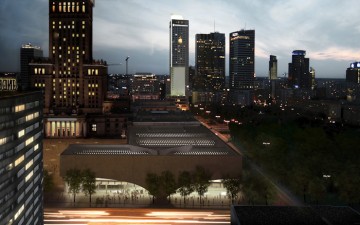 Future MOMA building in Warsaw
Future MOMA building in Warsaw
“There were calls some years ago to knock down the Palace of Culture – that symbol of Stalinist power in Poland,” Mytkowska says. “And then to open up the heart of the city’s space around the palace to developers, to commercial Poland. But the new ideas are far more interesting. We are creating a space that celebrates not history, martyrdom, honour duty – the usual Polish state - but creativity and the future,” she says.
The museum is currently tucked away in an untidy back alley behind Emilii Plater, across the way from Plac Defilad, where the new museum will be built, if all goes to plan, by 2016, the year Warsaw hopes it will hold the mantle of European Capital of Culture.
“We want to find a monumental humility, not fighting with the Palace of Culture and Science. This is a mark of confidence, complementing and acknowledging the past, not seeking to ignore, fight or apologise for it. It is, simply, what it is. The Warsaw museum is about playful modernism, speaking with it, enjoying it, celebrating it, but not a slave to it,” says Mytkowska.
Across the Vistula river another “Grand Project”, another stab at reinventing Warsaw. Down the way from the National Stadium, being built for Euro 2012, Warsaw’s famous Sinfonia Varsovia – one of the world's leading ensembles of its size – is another homeless Polish creature looking for a home.
Janusz Marynowski, General Director of Sinfonia Varsovia, also speaks - from his office high up in the Palace of Culture overlooking the site of the (hoped for) future MOMA – of Warsaw’s need for a new urban space, a new dialectic of urban/cultural/public life in the city. “We have been homeless for a long-time,” he says. “Now we may, may, have a home at long last.”
The design of the new symphony building in a poor part of Praga, an area that survived mostly intact during the war, has been approved and Marynowski says all they now need is the money to go ahead. An EU application will be submitted this year, he says. “The project is a microcosm of Poland’s love of culture and also its history. Warsaw needs a new urban and cultural space, creating new ambience, new light. We want to bring people into classical music.”
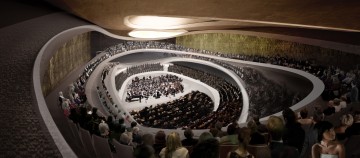 Sinfonia Varsovia Concert Hall project,
Sinfonia Varsovia Concert Hall project,
Atelier Thomas Pucher
Film critic Mateusz Werner shares the optimism and sense of reconnecting with some lost of ways of “doing culture” in Poland. “Polish film makers are now subsidised by the Polish Film Institute (PISF), which is financed from a special tax, for broadcasters, distributers and cinema owners and this helps a lot,” he says. “After 1989 we lost a lot of ground, but this now seems to work and is much better than before, giving film makers some stability and solid foundations.”
In Kraków a new museum celebrating contemporary art, via – among many other things – an exhibition History in Art, things are also changing. “There is this great contrast between our [Poland’s] pathetic past and our love of the ironic,” director of the Museum of Contemporary Art in Kraków (MOCAK), Maria Anna Potocka, says. “We want to celebrate diversity. I see these expositions [at MOCAK] as islands of history, each exposition unique.” The opening of MOCAK on 19 May can be seen perhaps as also a part of a new confidence to say something about people’s real lives, not the glossy version of a Poland that doesn’t quite know how it wants to talk about itself, how to show the world who it is. It is beyond politics, beyond ideology, but it is both very political and ideological, both directly and incidentally. “The History in Art exposition beautifully shows this, how art can transform our imaginations, shed light on reality, but also how it changes over time," says Potocka. History cannot be erased, of course, but it can be celebrated as well as expressed in martyred and tortured terms.
In This Thing Together
Coming from a Western European social democratic state and growing up in the 1970s and 1980s when that state was being slowly worn away I was always surprised by the lack of what one might call “Middle Class Socialism” in Poland. Not really surprising, given the need and the desire to get as far and as quickly away from “Real Socialism” as possible in the 1990s, but in talks with Polish friends, people working in universities, in culture and media – the natural habitat of people from the left – I could never fully grasp the depth of people’s antipathies towards “the State”, an institution to be feared, played or avoided. Making money, buying property, not going under within the new capitalist world that emerged very rapidly after 1989, was the key, while most of these people at the same time – in their spare time of course – did “socially good deeds”, teaching part time in poor areas, working for charities, food for the poor, education and a lot of emphasis on healthy, local food, local traditions, the rural getaway, being in touch with nature. All what one might call proto-socialism. The left as a political force was associated with a bunch of ex-communists whose impulses tended still be top-down, materialistic and devoid of any real contact with grass roots needs, with what people do, what they take pleasure in doing, what gives their lives meaning. The Christian Socialism of my own youth, communities based on a moral sense of “doing good” and “working together” was – is – always there (here) in Poland, but seemed to lack any coherent voice, no sense of collective identity. Citizens of Culture may be part of a wider and deeper process of creating something that slowly knits together the disparate interests, needs, skills and desires of the curious collective entity that is Poland.

